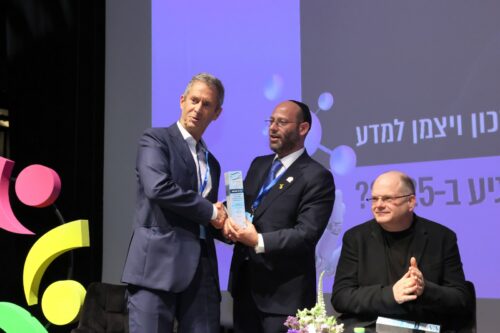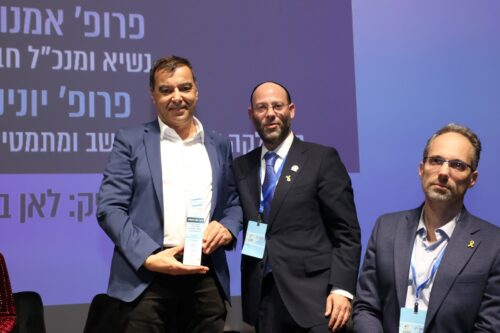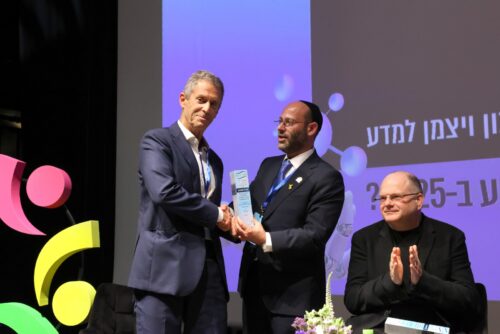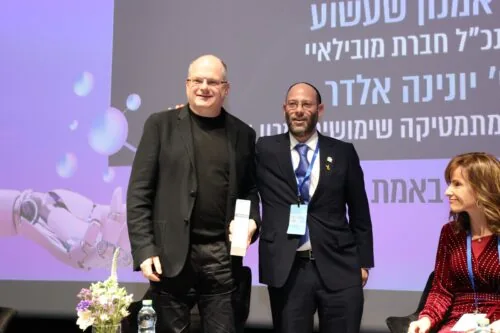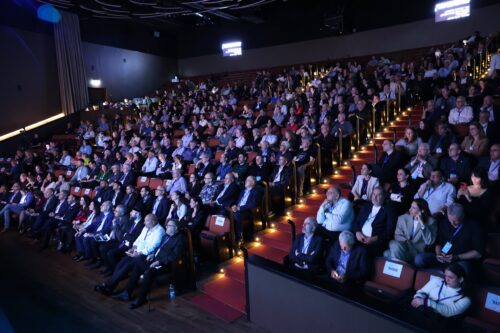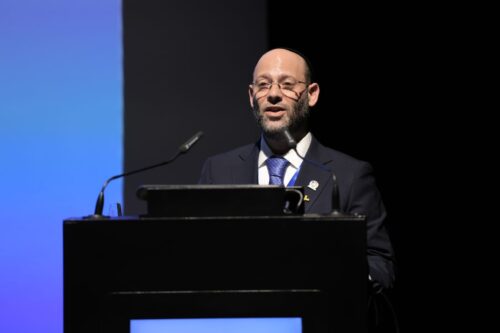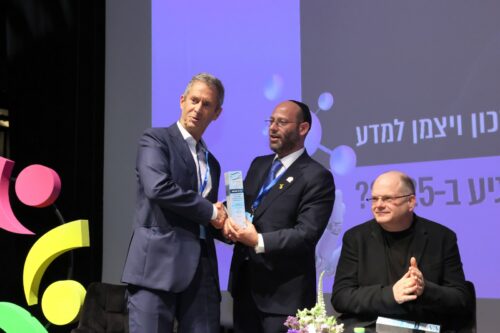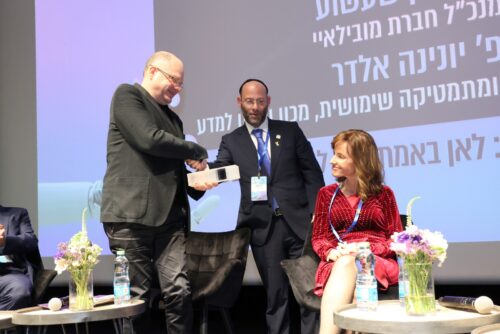
How does a person with a severe brain injury play chess? What does the fundus of our eye teach about the chance of getting Parkinson's? When did the family doctor know to tell us that next month we will suffer from pain? And can a robot pass a specialization exam written for a flesh-and-blood examinee? At the Weizmann Institute of Science last night (Wednesday) the 2nd annual conference of the “For You” organization was held, where the latest technological developments of artificial intelligence and their application in the world of medicine were presented, and judging by the news coming out of there, it seems that the sky is the limit: on the one hand, the computer has reached a point where He surpasses man in the prevention of diseases, in their diagnosis and perhaps in the future also in their treatment; On the other hand, there is no substitute – and apparently there will never be a substitute – for the virtues of the human doctor.
At the extraordinary conference, the first of its kind in Israel, which was initiated by the chairman and founder of an organization for you, Rabbi Yossi Arablich, the senior managers of the AI giants from Israel and the world, leading international scientists and heads of the health system, gathered with the aim of creating collaborations and harnessing the significant technological revolution of the century The 21st for the sake of the highest goal – saving lives, extending life expectancy and improving their quality. Among the organizations that mobilized for the effort and sent the best minds of their people to the gathering: the companies Google, Microsoft, Mobileye and Check Point, which are at the forefront of the development of artificial intelligence in the world.
State President Yitzhak (Boji) Herzog, who two years ago awarded the organization “For your sake” and Rabbi Arablich the President's Award for Volunteer, sent his blessing to the participants of the conference and said: “There is a clear connection between the capabilities of the Israeli health system and the commitment to innovation and creativity. This is the principle according to which We work 'for you' for more than twenty thousand patients every year. In recent months, you have proven this even more strongly when you stood by the side of the IDF wounded and the victims of the October 7th massacre. Thanks to the need to always be in the front row, the conference you are participating in takes place.”
“Artificial intelligence has enormous effects, and this may be the next chapter in human history,” added President Herzog. “This conference can be an opportunity to understand the significant consequences inherent in artificial intelligence. I was happy to find out that the AI giants are actively mobilized for the issue. I want to thank the person who leads this effort, Rabbi Yossi Arablich, who always does good, to whom I had the privilege of awarding him the President's Medal, which His life is dedicated to ensuring that patients can receive the most professional assistance and support.”
Prof. Ran Blitzer, VP of the Klalit Health Fund and head of its innovation department, reviewed at the conference the latest developments of AI and described his personal experience following its new applications in the world of medicine: “I feel that the science fiction movies I saw as a child are coming true every week before my eyes “. He said that only in the last few days a document was published showing a paralyzed man succeeding in playing chess with the help of “connecting” a computer to his brain. “Nowadays it is possible to enter your head in the deepest sense of the word – even without touching you,” he said.
Regarding preventive medicine, the diagnosis and prediction of future problems, Prof. Blitzer described how artificial intelligence helps in the early detection of silent and dormant serious diseases, until its effectiveness in saving lives has jumped by dozens of percent – and the hand is tilted. In some cases, the number of hospitalization days was reduced by almost half thanks to the new technology, so the benefit of using it is also financial. “Just like we won't drive the car over and over until smoke rises from the engine, but we will treat it first – the same will be true in the field of medicine,” concluded the VP of Klalit. “Instead of the patient coming when something hurts, the doctor will call him: 'Come. You will have a problem tomorrow or next week or in two months.”
Blitzer said that if in the past the computer did what the doctor does, and its whole advantage was that it did not suffer from human weaknesses such as fatigue and burnout, then today it reaches achievements that a flesh-and-blood doctor, even the most talented, is unable to do and does not know how to explain. Thus, for example, he said that artificial intelligence is now able to predict by the fundus of the eye who has or will have Parkinson's or Alzheimer's and to identify whether the subject is male or female – something that man has neither learned nor been taught to do. According to him, “the computer already learns by itself and implements by itself.”
What's more: Prof. Ran Blitzer revealed that the latest studies prove that computers are not only more accurate and “professional” than doctors and nurses, but are even perceived by patients as more empathetic than them. He wondered rhetorically: “Is this the future we want to see?”, and immediately clarified: “I'm a big believer in human contact.” Blitzer predicts and hopes that artificial intelligence will not make doctors redundant, but rather will be “our salvation in the therapist-patient relationship.”
He explained that in the past decades, the medical staff have become “officials who spend most of their time in front of the computer clicking away”, and the revolution taking place now “will relieve them of the clerical work and return medicine to what it should be”. Another statement at the conference was that the AI itself will not replace the human doctor, but doctors who use the technology will replace doctors who do not use it.
Alon Chaimovich, CEO of Microsoft Israel, who also participated in the conference, said that the importance and significance of the technological revolution brought about by artificial intelligence cannot be overstated. “This period is very reminiscent of the 90s when we invented the Internet and the 2000s We introduced the smart phones,” he explained.
Prof. Yossi Matias, Vice President of Google Global and CEO of Google's Research and Development Center in Israel, added that the health sector has the greatest potential for groundbreaking applications of AI, and that the organization of which he is the leader is devoting enormous efforts to developments that will help bring this out of power to the verb
He revealed that a model created by Google was able to pass the exams given to doctors in the United States with a score of 85. Prof. Roi Ozari, Vice President for Resource Development and Communication at the Weizmann Institute of Science, also said: “Artificial intelligence has the power to completely change the rules of the game. This is a real and profound technological revolution which are already revolutionizing research. The impact of the use of these technologies will reach the patient's own home in the not too distant future. We are just the beginning of the road.”
Professor Amnon Shashua, president and CEO of Mobileye, described the real leap that AI has made in recent times. Big opinions,” he said. “Six months ago I would have said that another scientific leap was needed. The surprise of the last few months is that, in my opinion, we no longer need such a revolution. In the coming years there will be systems that can solve problems that few experts can solve, and in the future they will be able to solve problems that no human can solve.”
Gil Schweid, co-founder and CEO of Check Point and laureate of the Israel Prize, also participated in the 'For You' conference, and said of Rabbi Arablich's organization that “it has a lot of intelligence – and it is not artificial.” As an information security expert Schweid also wanted to address the dangers that the AI brings with it, such as “poisoning” the sources of information, and explained: “My job is to think with the bad seniors and the bad potential of the world. With every new invention there are new dangers. Fire was invented 200,000 years ago and to this day there are dangers of fire.” In summing up his words, he said that “every invention should be used”, but at the same time he emphasized the need to develop control systems that would protect the advanced technology.
The chairman of the Israel Medical Association (RAI), Prof. Zion Hagai, also participated in the conference and presented Arablich with a shield of appreciation on behalf of the organization for his activities “for you” in recent years in general and for the assistance and support he provided to the soldiers and civilians who were injured in the surprise attack on 7/10 and the war that broke out in its wake in particular. Prof. Hagi wanted to remind the conference attendees that alongside the impressive technological achievements, the Israeli healthcare system also suffers from difficulties.
“With iron swords, we proved that we are one of the leaders in the world, thanks to the human resource, when the hospitals treated a number of wounded who arrived in a short time in volumes that had not been equaled since the Second World War,” said Prof. Hagai. However, the chairman of the RA pointed out the lack of manpower in certain areas of specialization and criticized the Ministry of Health for not working to increase the number of doctors in Israel and for the rapid absorption of Israeli students studying medicine abroad to integrate into work in the field in their country, thus urging them to contribute their skills in the countries others.
“Unfortunately, the ministry prefers to outsource the problem and chooses the easy solution of an online service with doctors from abroad,” he argued. “How can a psychiatrist from New Zealand identify with someone who went through the 7/10 disaster here and treat him through a computer?” He concluded: “There is no doubt that artificial intelligence brings with it a real revolution. It is very important and we should not underestimate its value. However, our health system is smart – but starving.”
The CEO of the Klalit Health Fund, Eli Cohen, also sought to praise the devotion of the medical staff in his organization and the entire health system in recent months, which he defined as “the greatest AR incident in the history of the country and one of the greatest described in history. Cohen told about several incidents in which doctors, Nurses and others operated under fire – not in a military framework but as civilians. “There is no employment agreement or treaty that allows me to oblige them in this, but it is their DNA and it is our strength,” he said. “When reality is chaotic, then even in the days of AI and big data There is no substitute for human contact with patients.”
The Chairman of the Association of Friends of the “For You'' organization, businessman Benny Steinmetz, explained at the conference why in his opinion the connection between medicine and innovation is a winning combination. A mountain of uncertainty, a mountain of not knowing, a mountain of anxiety,” he said. “When it comes to the information challenge, the simple person at the end is facing a threatening mountain, a mountain of data, a mountain of time, a mountain of complexity. In the valley between these two mountain ranges, our conference enters.”
According to him, “The 'For You' organization was established to enable the common man to face the challenges of uncertainty and lack of knowledge, while artificial intelligence technology can deal with the mountains of data, defeat the challenge of time, break down the complexity”, and the result is that “the capital, the heart and the human experience On the one hand, and the innovation on the other, can provide the person always standing before our eyes, the ability to break forward, overcome the obstacles, and go to a better health future.”
In the “Artificial Intelligence in the Service of Medicine” conference, which was moderated by your friend Yael Bar Zohar and organized by the production company “The station” – both on a voluntary basis, the president of the organization, Prof. Yosef Peres, and the vice president and chairman of research and innovation, Dr. Gadi, also participated Neumann.
